- Home
- Deborah Harkness
A Discovery of Witches: A Novel (All Souls Trilogy) Page 34
A Discovery of Witches: A Novel (All Souls Trilogy) Read online
Page 34
Changing in the bathroom behind a partially closed door, I listened to Matthew’s plans for the next day. These involved a long walk, another long ride, and more work in the study.
I agreed to all of it—provided that the work came first. The alchemical manuscript was calling to me, and I was eager to get a closer look at it.
I got into Matthew’s vast four-poster, and he tightened the sheets around my body before pinching out the candles.
“Sing to me,” I said, watching his long fingers fearlessly move through the flames. “An old song—one Marthe likes.” Her wicked fondness for love songs had not gone unnoticed.
He was quiet for a few moments while he walked through the room, snuffing the candles and trailing shadows behind him as the room fell into darkness. He began to sing in his rich baritone.
“Ni muer ni viu ni no guaris,
Ni mal no·m sent e si l’ai gran,
Quar de s’amor no suy devis,
Ni no sai si ja n’aurai ni quan,
Qu’en lieys es tota le mercés
Que·m pot sorzer o decazer.”
The song was full of yearning, and teetered on the edge of sadness. By the time he returned to my side, the song was finished. Matthew left one candle burning next to the bed.
“What do the words mean?” I reached for his hand.
“‘Not dying nor living nor healing, there is no pain in my sickness, for I am not kept from her love.’” He leaned down and kissed me on the forehead. “‘I don’t know if I will ever have it, for all the mercy that makes me flourish or decay is in her power. ”
“Who wrote that?” I asked, struck by the aptness of the words when sung by a vampire.
“My father wrote it for Ysabeau. Someone else took the credit, though,” Matthew said, his eyes gleaming and his smile bright and content. He hummed the song under his breath as he went downstairs. I lay in his bed, alone, and watched the last candle burn until it guttered out.
Chapter 21
A vampire holding a breakfast tray greeted me the next morning after my shower.
“I told Marthe you wanted to work this morning,” Matthew explained, lifting the cover that was keeping the food warm.
“You two are spoiling me.” I unfolded the napkin waiting on a nearby chair.
“I don’t think your character is in any real danger.” Matthew stooped and gave me a lingering kiss, his eyes smoky. “Good morning. Did you sleep well?”
“Very well.” I took the plate from his hands, my cheeks reddening at the memory of the invitation I’d extended to him last night. There was still a twinge of hurt when I recalled his gentle rebuff, but this morning’s kiss confirmed that we had slipped past the limits of friendship and were moving in a new direction.
After my breakfast we headed downstairs, turned on our computers, and got to work. Matthew had left a perfectly ordinary nineteenth-century copy of an early English translation of the Vulgate Bible on the table next to his manuscript.
“Thank you,” I called over my shoulder, holding it up.
“I found it downstairs. Apparently the one I have isn’t good enough for you.” He grinned.
“I absolutely refuse to treat a Gutenberg Bible as a reference book, Matthew.” My voice came out more sternly than anticipated, making me sound like a schoolmarm.
“I know the Bible backwards and forwards. If you have a question, you could just ask me,” he suggested.
“I’m not using you as a reference book either.”
“Suit yourself,” he said with a shrug and another smile.
With my computer at my side and an alchemical manuscript before me, I was soon absorbed in reading, analyzing, and recording my ideas. There was one distracting incident when I asked Matthew for something to weight down the book’s pages while I typed. He rummaged around and found a bronze medal with the likeness of Louis XIV on it and a small wooden foot that he claimed came from a German angel. He wouldn’t surrender the two objects without sureties for their return. Finally he was satisfied by several more kisses.
Aurora Consurgens was one of the most beautiful texts in the alchemical tradition, a meditation on the female figure of Wisdom as well as an exploration of the chemical reconciliation of opposing natural forces. The text in Matthew’s copy was nearly identical to the copies I’d consulted in Zurich, Glasgow, and London. But the illustrations were quite different.
The artist, Bourgot Le Noir, had been a true master of her craft. Each illumination was precise and beautifully executed. But her talent did not lie simply in technical mastery. Her depictions of the female characters showed a different sensibility. Bourgot’s Wisdom was full of strength, but there was a softness to her as well. In the first illumination, where Wisdom shielded the personification of the seven metals in her cloak, she bore an expression of fierce, maternal pride.
There were two illuminations—just as Matthew had promised—that weren’t included in any known copy of Aurora Consurgens. Both appeared in the final parable, devoted to the chemical wedding of gold and silver. The first accompanied words spoken by the female principle in alchemical change. Often represented as a queen dressed in white with emblems of the moon to show her association with silver, she had been transformed by Bourgot into a beautiful, terrifying creature with silvery snakes instead of hair, her face shadowed like a moon eclipsed by the sun. Silently I read the accompanying text, translating the Latin into English: “Turn to me with all your heart. Do not refuse me because I am dark and shadowed. The fire of the sun has altered me. The seas have encompassed me. The earth has been corrupted because of my work. Night fell over the earth when I sank into the miry deep, and my substance was hidden.”
The Moon Queen held a star in one outstretched palm. “From the depths of the water I cried out to you, and from the depths of the earth I will call to those who pass by me,” I continued. “Watch for me. See me. And if you find another who is like me, I will give him the morning star.” My lips formed the words, and Bourgot’s illumination bought the text to life in the Moon Queen’s expression that showed both her fear of rejection and her shy pride.
The second unique illumination came on the next page and accompanied the words spoken by the male principle, the golden Sun King. The hair on my neck rose at Bourgot’s depiction of a heavy stone sarcophagus, its lid open just enough to reveal a golden body lying within. The king’s eyes were closed peacefully, and there was a look of hope on his face as if he were dreaming of his release. “I will rise now and go about the city. In its streets I will seek out a pure woman to marry,” I read, “her face beautiful, her body more beautiful, her raiment most beautiful. She will roll away the stone from the entrance of my tomb and give me the wings of a dove so that I might fly with her to the heavens to live forever and be at rest.” The passage reminded me of Matthew’s badge from Bethany and Lazarus’s tiny silver coffin. I reached for the Bible.
“Mark 16, Psalms 55, and Deuteronomy 32, verse 40.” Matthew’s voice cut through the quiet, spouting references like an automated biblical concordance.
“How did you know what I was reading?” I twisted in my chair to get a better view of him.
“Your lips were moving,” he replied, staring fixedly at his computer screen, his fingers clattering on the keys.
Pressing my lips together I returned to the text. The author had drawn on every biblical passage that fit the alchemical story of death and creation, paraphrasing and cobbling them together. I pulled the Bible across the desk. It was bound in black leather and a gold cross adorned the cover. Opening it to the Gospel of Mark, I scanned chapter 16. There it was, Mark 16:3, “And they said one to another: Who shall roll us back the stone from the door of the sepulchre?”
“Find it?” Matthew inquired mildly.
“Yes.”
“Good.”
The room grew silent once more.
“Where’s the verse about the morning star?” Sometimes my pagan background was a serious professional liability.
&n
bsp; “Revelation 2, verse 28.”
“Thank you.”
“My pleasure.” A smothered laugh came from the other desk. I bent my head to the manuscript and ignored it.
After two hours of reading tiny, Gothic handwriting and searching for corresponding biblical references, I was more than ready to go riding when Matthew suggested it was time for a break. As an added bonus, he promised to tell me over lunch how he knew the seventeenth-century physiologist William Harvey.
“It’s not a very interesting story,” Matthew had protested.
“Maybe not to you. But to a historian of science? It’s the closest thing I’ll get to meeting the man who figured out that the heart is a pump.”
We hadn’t seen the sun since we’d arrived at Sept-Tours, but neither of us minded. Matthew seemed more relaxed, and I was surprisingly happy to be out of Oxford. Gillian’s threats, the picture of my parents, even Peter Knox—they all receded with each hour that passed.
As we walked out into the gardens, Matthew chatted animatedly about a problem at work that involved a missing strand of something that should have been present in a blood sample but wasn’t. He sketched out a chromosome in the air in an effort to explain, pointing to the offending area, and I nodded even though what was at stake remained mysterious. The words continued to roll out of his mouth, and he put an arm around my shoulder, drawing me close.
We rounded a line of hedges. A man in black stood outside the gate we’d passed through yesterday on our ride. The way he leaned against a chestnut tree, with the elegance of a leopard on the prowl, suggested he was a vampire.
Matthew scooped me behind him.
The man pulled himself gracefully away from the tree’s rough trunk and strolled toward us. The fact that he was a vampire was now confirmed by his unnaturally white skin and huge, dark eyes, emphasized by his black leather jacket, jeans, and boots. This vampire didn’t care who knew he was different. His wolfish expression was the only imperfection in an otherwise angelic face, with symmetrical features and dark hair worn curling low onto his collar. He was smaller and slighter than Matthew, but the power he exuded was undeniable. His eyes sent coldness deep under my skin, where it spread like a stain.
“Domenico,” Matthew said calmly, though his voice was louder than usual.
“Matthew.” The glance the vampire turned on Matthew was full of hate.
“It’s been years.” Matthew’s casual tone suggested that the vampire’s sudden appearance was an everyday occurrence.
Domenico looked thoughtful. “When was that? In Ferrara? We were both fighting the pope—though for different reasons, as I remember. I was trying to save Venice. You were trying to save the Templars.”
Matthew nodded slowly, his eyes fixed on the other vampire. “I think you must be right.”
“After that, my friend, you seemed to disappear. We shared so many adventures in our youth: on the seas, in the Holy Land. Venice was always full of amusements for a vampire such as you, Matthew.” Domenico shook his head in apparent sorrow. The vampire inside the château gate did look Venetian—or like some unholy cross between an angel and a devil. “Why did you not come and visit me when you passed between France and one of your other haunts?”
“If I caused offense, Domenico, it was surely too long ago to be of any concern to us now.”
“Perhaps, but one thing hasn’t changed in all these years. Whenever there’s a crisis, there’s a de Clermont nearby.” He turned to me, and something avaricious bloomed on his face. “This must be the witch I’ve heard so much about.”
“Diana, go back to the house,” Matthew said sharply.
The sense of danger was palpable, and I hesitated, not wanting to leave him alone.
“Go,” he said again, his voice as keen edged as a sword.
Our vampire visitor spotted something over my shoulder and smiled. An icy breeze brushed past me and a cold, hard arm linked through mine.
“Domenico,” chimed Ysabeau’s musical voice. “What an unexpected visit.”
He bowed formally. “My lady, it is a pleasure to see you in such good health. How did you know I was here?”
“I smelled you,” Ysabeau said contemptuously. “You come here, to my house, uninvited. What would your mother say if she knew you behaved in such a fashion?”
“If my mother was still alive, we could ask her,” Domenico said with barely concealed savagery.
“Maman, take Diana back to the house.”
“Of course, Matthew. We will leave the two of you to talk.” Ysabeau turned, tugging me along with her.
“I’ll be gone more quickly if you let me deliver my message,” Domenico warned. “If I have to come back, I won’t be alone. Today’s visit was a courtesy to you, Ysabeau.”
“She doesn’t have the book,” Matthew said sharply.
“I’m not here about the witches’ damned book, Matthew. Let them keep it. I’ve come from the Congregation.”
Ysabeau exhaled, soft and long, as if she’d been holding her breath for days. A question burbled to my lips, but she silenced it with a warning look.
“Well done, Domenico. I’m surprised you have the time to call on old friends, with all your new responsibilities.” Matthew’s voice was scornful. “Why is the Congregation wasting time paying official visits on the de Clermont family when there are vampires leaving bloodless corpses all over Europe for humans to find?”
“It’s not forbidden for vampires to feed on humans—though the carelessness is regrettable. As you know, death follows vampires wherever we go.” Domenico shrugged off the brutality, and I shivered at his casual disregard for frail, warmblooded life. “But the covenant clearly forbids any liaison between a vampire and a witch.”
I turned and stared at Domenico. “What did you say?”
“She can speak!” Domenico clasped his hands in mock delight. “Why not let the witch take part in this conversation?”
Matthew reached around and drew me forward. Ysabeau remained entwined through my other arm. We stood in a short, tight line of vampire, witch, and vampire.
“Diana Bishop.” Domenico bowed low. “It’s an honor to meet a witch of such ancient, distinguished lineage. So few of the old families are still with us.” Every word he uttered—no matter how formally phrased—sounded like a threat.
“Who are you?” I asked. “And why are you concerned with whom I spend time?”
The Venetian looked at me with interest before his head fell back and he howled with laughter. “They said you were argumentative like your father, but I didn’t believe them.”
My fingers tingled slightly, and Ysabeau’s arm grew fractionally tighter.
“Have I made your witch angry?” Domenico’s eyes were fixed on Ysabeau’s arm.
“Say what you came to say and get off our land.” Matthew’s voice was entirely conversational.
“My name is Domenico Michele. I have known Matthew since I was reborn, and Ysabeau nearly as long. I know neither of them so well as I knew the lovely Louisa, of course. But we should not speak lightly of the dead.” The Venetian crossed himself piously.
“You should try not to speak of my sister at all.” Matthew sounded calm, but Ysabeau looked murderous, her lips white.
“You still haven’t answered my question,” I said, drawing Domenico’s attention once more.
The Venetian’s eyes glittered with frank appraisal.
“Diana,” Matthew said, unable to stop the rumble in his throat. It was as close as he’d ever been to growling at me. Marthe came out of the kitchens, a look of alarm on her face.
“She is more fiery than most of her kind, I see. Is that why you’re risking everything to keep her with you? Does she amuse you? Or do you intend to feed on her until you get bored and then discard her, as you have with other warmbloods?”
Matthew’s hands strayed to Lazarus’s coffin, evident only as a bump under his sweater. He hadn’t touched it since we’d arrived in Sept-Tours.
Domenico’s
keen eyes noticed the gesture, too, and his answering smile was vindictive. “Feeling guilty?”
Furious at the way Domenico was baiting Matthew, I opened my mouth to speak.
“Diana, go back to the house immediately.” Matthew’s tone suggested that we would have a serious, unpleasant talk later. He pushed me slightly in Ysabeau’s direction and put himself even more squarely between his mother, me, and the dark Venetian. By that time Marthe was nearby, her arms crossed over her sturdy body in a striking imitation of Matthew.
“Not before the witch hears what I have to say. I have come to serve you with a warning, Diana Bishop. Relationships between witches and vampires are forbidden. You must leave this house and no longer associate with Matthew de Clermont or any of his family. If you don’t, the Congregation will take whatever steps are necessary to preserve the covenant.”
“I don’t know your Congregation, and I agreed to no such covenant,” I said, still furious. “Besides, covenants aren’t enforceable. They’re voluntary.”
“Are you a lawyer as well as a historian? You modern women with your fine educations are so fascinating. But women are no good at theology,” Domenico continued sorrowfully, “which is why we never thought it worth educating you in the first place. Do you think we adhered to the ideas of that heretic Calvin when we made these promises to one another? When the covenant was sworn, it bound all vampires, daemons, and witches—past, present, and future. This is not a path you can follow or not as you please.”
“You’ve delivered your warning, Domenico,” Matthew said in a voice like silk.
“That’s all I have to say to the witch,” the Venetian replied. “I have more to say to you.”
“Then Diana will return to the house. Get her out of here, Maman,” he said tersely.
This time his mother did what he asked immediately, and Marthe followed. “Don’t,” Ysabeau hissed when I turned to look back at Matthew.

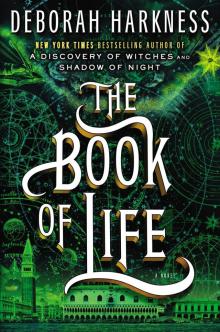 The Book of Life
The Book of Life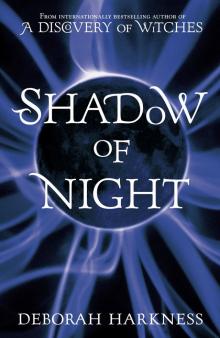 Shadow of Night
Shadow of Night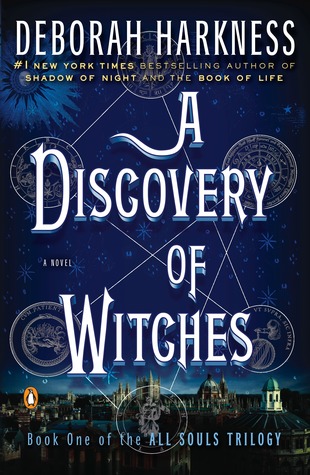 A Discovery of Witches
A Discovery of Witches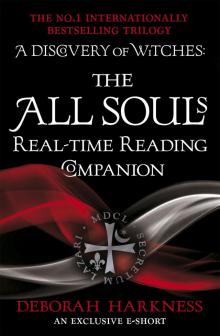 The All Souls Real-Time Reading Companion
The All Souls Real-Time Reading Companion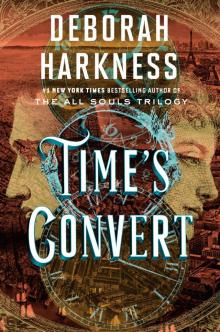 Time's Convert
Time's Convert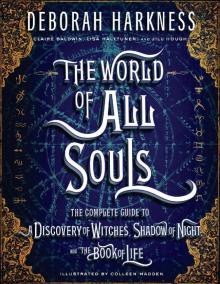 The World of All Souls
The World of All Souls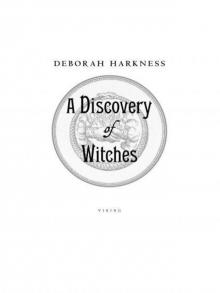 A Discovery of Witches: A Novel (All Souls Trilogy)
A Discovery of Witches: A Novel (All Souls Trilogy)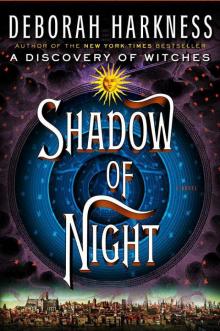 Shadow of Night: A Novel
Shadow of Night: A Novel